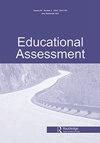学生参与国家教育进步评估:现有研究的系统回顾与元分析
IF 2.3
Q1 EDUCATION & EDUCATIONAL RESEARCH
引用次数: 1
摘要
摘要本研究采用多动机构念,包括努力、价值和期望,对四年级、八年级和十二年级学生的NAEP学习动机进行了实证研究。分析得出了几个发现。首先,在四年级(86%)、八年级(59%)和十二年级(35%)的学生中,对NAEP表现良好的重要性的认知存在明显差异。其次,对同意各种期望陈述(例如,“我擅长数学”)的学生百分比的描述性数据进行元分析,发现年级之间的差异很小。然而,对同意各种价值陈述(例如,“我喜欢数学”)的学生百分比数据的类似荟萃分析显示,年级之间存在显著差异。第三,领域特定动机与NAEP成就有显著的正相关关系。最后,一些干预措施——尤其是财政激励措施——可能对NAEP的实现产生适度的积极影响。本文章由计算机程序翻译,如有差异,请以英文原文为准。
Student Engagement on the National Assessment of Educational Progress (NAEP): A Systematic Review and Meta-Analysis of Extant Research
ABSTRACT This systematic review examines empirical research about students’ motivation for NAEP in grades 4, 8, and 12 using multiple motivation constructs, including effort, value, and expectancy. Analyses yielded several findings. First, there are stark differences in the perceived importance of doing well on NAEP among students in grades 4 (86%), 8 (59%), and 12 (35%). Second, meta-analyses of descriptive data on the percentage of students who agreed with various expectancy statements (e.g., “I am good at mathematics”) revealed minimal variations across grade level. However, similar meta-analyses of data on the percentage of students who agreed with various value statements (e.g., “I like mathematics”) exposed notable variation across grade levels. Third, domain-specific motivation has a positive, statistically significant relationship with NAEP achievement. Finally, some interventions – particularly financial incentives – may have a modest, positive effect on NAEP achievement.
求助全文
通过发布文献求助,成功后即可免费获取论文全文。
去求助
来源期刊

Educational Assessment
EDUCATION & EDUCATIONAL RESEARCH-
CiteScore
3.20
自引率
6.70%
发文量
24
期刊介绍:
Educational Assessment publishes original research and scholarship on the assessment of individuals, groups, and programs in educational settings. It includes theory, methodological approaches and empirical research in the appraisal of the learning and achievement of students and teachers, young children and adults, and novices and experts. The journal reports on current large-scale testing practices, discusses alternative approaches, presents scholarship on classroom assessment practices and includes assessment topics debated at the national level. It welcomes both conceptual and empirical pieces and encourages articles that provide a strong bridge between theory and/or empirical research and the implications for educational policy and/or practice.
 求助内容:
求助内容: 应助结果提醒方式:
应助结果提醒方式:


